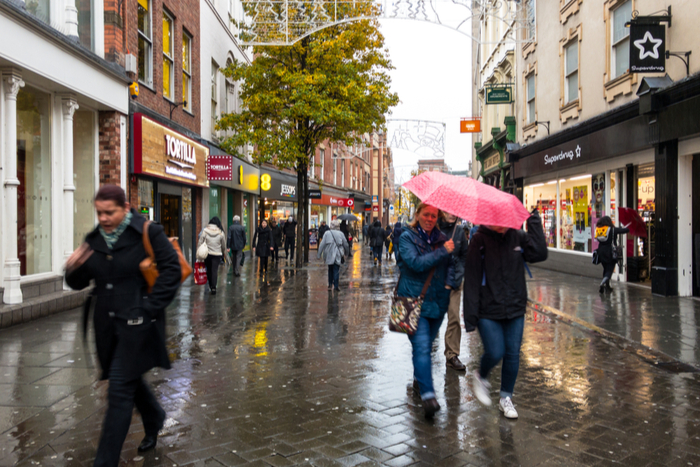// January retail sales by value and volume grew 1.2% & 0.9% respectively on a month-on-month basis, ONS data shows
// Year-on-year, January retail sales by value and volume grew 2.1% & 0.8% respectively
// However, retail sales by value and volume fell 0.5% & 0.8% respectively in the 3 months to January
UK retail sales rebounded in January after a week end to 2019, with the so-called “Boris bounce” improving consumer sentiment since since the General Election.
According to the latest ONS data, retail sales in January by value and volume grew 1.2 per cent and 0.9 per cent respectively when compared to December.
The rise in volume marked the biggest rise since March last year and a stronger turnaround than the 0.7 per cent month-on-month growth predicted on average by economists in a Reuters poll.
READ MORE:
- Christmas was not so merry for retailers, ONS data shows
- Retail sales largely flat in January (BRC-KPMG)
- Retail sales flatline in January (CBI)
On a year-on-year basis, January retail sales by value and volume grew 2.1 per cent and 0.8 per cent respectively.
However, looking at the three-month period to January, retail sales by value and volume fell 0.5 per cent and 0.8 per cent respectively compared to the previous quarter.
On a year-on-year basis though, retail sales in the three months ending January increased 1.5 per cent and 0.8 per cent by value and volume respectively.
The figures come after consumer demand faltered in the latter part of 2019 against a backdrop of political deadlock in parliament over Brexit.
This culminated in a snap election in December that returned Prime Minister Boris Johnson to office with a comfortable majority, prompting what has been desribed as a “Boris bounce” with an improvement in consumer sentiment.
“Retail sales fell overall in the latest three months with declines across all sectors,” ONS head of retail sales Rhian Murphy said.
“This was despite a rebound in January with strong growth for most stores, although petrol stations saw a large decline which coincided with an increase in their fuel prices.”
The ONS figures paint a different store to separate monthly figures from the BRC and CBI, both which showed January retail sales had flatlined.
Commenting on the ONS figures, Deloitte head of retail Ian Geddes said consumers started the new decade on “a confidence high”, counteracting the seasonal dip that January usually brings.
“Whilst this is positive news for retailers, following a difficult Christmas for some that was punctuated by deep discounting, some lingering caution remains,” he said.
“Consumers may still be in ‘careful shopping mode’, but for how long is yet to be seen.
“In recent years we have seen the emergence of a more conscious consumer, equipped with greater awareness of the ethical and environmental impact of what they buy.
“For some, this has simply meant buying less and decluttering or, in fashion, buying into new services such as wardrobe rentals.
“For other consumers, the event of a new year has kick-started new habits, be it switching to a plant-based diet for ‘veganuary’, or restricting alcohol consumption for ‘dry January’.
“Retailers are catering to these seasonal trends more than ever, bringing new product ranges to shop floors that match changing consumer tastes.
“Similar changing behaviours are also reflected in the growth of online sales, which has increased 4.9 per cent this month, but increasing at a much slower pace year-on-year.”
BRC head of retail insights Kyle Monk said: “UK sales volumes up rose a modest 0.9 per cent month-on-month in January, the first rise since October, suggesting that the rise in consumer confidence since the December election may have lifted willingness to spend.
“A rise in sales, coupled with the tightness in the labour market and inflation accelerating ahead of forecast, adds to the case that the Bank of England should hold off cutting interest rates.
“However, weakness over the festive period means that sales volumes are only up 0.8 per cent year-on-year and still down 0.8 per cent on three-month by three-month basis.”
He added: “It is essential progress is made quickly in the upcoming EU trade negotiations otherwise the UK risks squandering any boost to consumer confidence.
“Without a comprehensive deal, food and other goods will face extensive tariffs, checks and delays at the border – raising costs and creating disruption for consumers.”
Institute of Customer Service chief executive Jo Causon said: “Despite a stuttering economy, consumers have enjoyed a positive start to the year, in part due to heavy discounting in the January sales.
“The challenge for retailers however remains significant. Customer satisfaction is at its lowest level since 2015, as customers are becoming increasingly discerning in their purchasing choices and punishing brands that fall short on best practice.
“Torrential rain, strong winds and worries over coronavirus all conspire to keep shoppers at home, the challenge for High Street retailers and restaurants is not to lose focus about the reasons to visit.
“Excellent personal service matters because it locks in return custom, building loyalty and trust to deliver better financial results and improved productivity.”
Fashion Retail Academy principal Lee Lucas said: “It is likely consumer confidence grew after December’s landslide in the general election.
“Shoppers may still have felt the Brexit cloud hanging over them, but used the excuse of the first convincing Westminster win in years to storm the sales racks.
“As the colder weather set in, the attractive discounts tabled in the January sales looked too tempting for consumers to pass up.
“The sector found itself on the frontline of the battle with economic and political uncertainty last year.
“These results mark a return to form for a sector that has clocked up seven consecutive months of no growth on a rolling quarterly basis for clothing sale volumes.”
Click here to sign up to Retail Gazette‘s free daily email newsletter
















